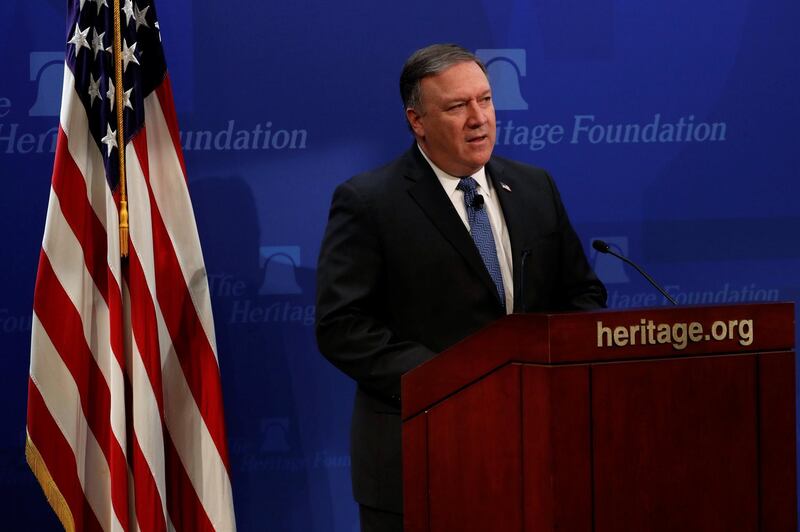“This is just the beginning,” said the new US Secretary of State Mike Pompeo yesterday as he promised new financial sanctions against the Iranian government, warning that “the sting of sanctions will be painful if the regime does not change course”.
It has only been two years since the US lifted sanctions against Tehran as part of the Iran nuclear deal. Now those sanctions, plus undisclosed new ones, will come back into effect, pressuring Iran to give up its nuclear programme.
The arrival of Mr Pompeo as America’s top diplomat marks a significant change in US foreign policy and a very welcome change in most capitals of the Gulf.
That his predecessor Rex Tillerson was viewed as ineffectual in most of the Gulf states is common knowledge. Months into his tenure, Mr Tillerson alienated most of the Gulf states by saying that Saudi Arabia and its allies should end their isolation of Qatar – as if that thought had never occurred to the kingdom’s diplomats.
What Mr Tillerson didn’t seem to understand was that the criticism that the Gulf states had over Qatar’s funding of groups around the region touched on the vital interests of their states. For them, these were not small issues but matters of national and regional security.
Exactly the same criticism was made of Mr Tillerson's view of the Iran deal, which he appeared to think was broadly working or could be tweaked. The view from the Gulf – and the view from the White House, it now appears – was that the deal was fundamentally flawed and needed to be comprehensively renegotiated or scrapped.
How different were Mr Tillerson's views from Mr Pompeo’s first major speech as secretary of state, when the latter called on Iran to remove all its forces from Syria and end its support for Hezbollah and Hamas.
Those, admittedly, are the US’s maximalist positions and even the most hardline hawks must realise Tehran will not simply offer them up. But as a statement of intent and as a message to allies that the new secretary of state takes the dangers the Gulf states in particular face from Iran seriously, it was powerful. In Abu Dhabi and Riyadh, the sense is that here, finally, is someone who understands the threat across the water.
Yet Mr Pompeo’s hardline stance, if implemented, carries certain risks and challenges.
He has to ensure that the American political machine treads a fine line between using enough financial leverage to force a new round of concessions without pushing Iran towards all-out war. There are voices within the US administration that appear eager to march to war. But the Middle East can ill afford another major conflict after the invasion of Iraq and the civil war of Syria.
The reason why the Gulf states are so against the Iran nuclear deal as it stood was because they believed it gave Iran time and money to pursue its own policies – policies that invariably threatened to destabilise the wider Middle East. But Iran has spent decades pursuing these aims and that gives it considerable leverage to retaliate against US pushback. Therein lies the great danger.
If the medium-term goal of this new American policy is to isolate Iran and force it back to the negotiating table to get a better deal – perhaps including concessions on its ballistic missile programme, for example – then it might be possible to see an end in sight that doesn’t spark all-out war.
But the real danger is that, in the inevitable back-and-forth and retaliatory attacks that will follow as Iran feels increasingly isolated, a spark will ignite a wider conflict or the US will be pushed into a corner where it feels it must strike Tehran. That could start an enormous conflagration.
The politics of this new policy are immensely tricky.
There's the internal politics of the White House, the interplay between Donald Trump, Mr Pompeo, National Security Adviser John Bolton and Secretary of Defence Jim Mattis.
There’s the interplay inside Tehran between the supreme leader, the Iranian president and powerful factions like the Iranian Revolutionary Guard Corps. Iran faced its strongest anti-government protests at the end of last year, focused on economic development. There is every chance that further sanctions could make those tensions worse – or instead push the Iranian public to blame the outside world and back their government.
There’s the wider field of the Middle East, where countries such as Russia, Turkey, Syria and Israel are all competing for influence. And there's the European aspect, with major powers still trying to make the deal work. European companies like Denmark’s shipping giant Maersk and France’s energy company Total will probably pull out of the Iran deal, costing them millions in lost sales as Russian and Chinese companies fill the gap. That will have political repercussions.
Tellingly, Mr Pompeo did not threaten allies who want to keep the nuclear deal going, simply saying “that is their decision to make and they know where we stand”. That could suggest the state department isn’t looking to fight on several fronts and will accept Europe conducting its own foreign policy.
But it will be tricky. Negotiating the Iran deal was a multi-year effort by countries right across the globe. Unpicking it will be just as difficult. In a volatile region, America's top diplomat has to ensure that the sting of new sanctions against Iran do not become the spark for a new regional conflict.





